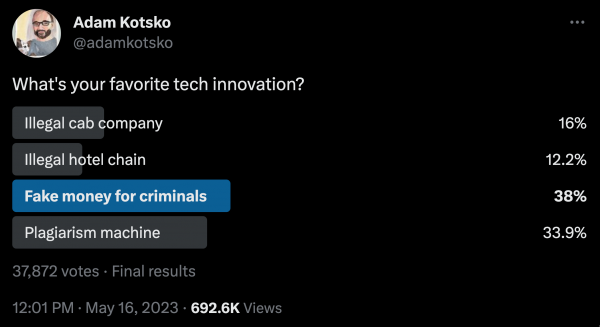Emptying Innovation - one metric at a time
tl;dr: metrics-obsessed capitalism is the reason why we can’t have nice things – and watch @tante’s talk
Back in Paris, I was semi-joking with friends about how the rate of technological innovations seem to have slowed down or come to a halt. The last “big” innovation that we could think about were smartphones, as carrying the internet permanently in our pockets was quite a change. But ever since, it mostly felt like minor variations on existing themes, as poked fun at in the post above. Which, in itself, is old news of course, the “it’s like X but for Y”-startup meme (think “it’s like Uber but for dogs”) goes back at least to the early 2010s if not more.
At this year’s re:publica, tante gave a great talk titled Empty Innovation: What are we even doing? (available on YouTube) that explores this phenomenon in more depth, and is more than worth the 30 minutes of your time. In brief, tante argues that we’re living in an age of stagnation where we might feel like there is a barrage of progress we have to adapt to all the time but in reality there is not any effective change.
Instead, we’re feeling placated by the supposed “progress” and the empty promises for the future of these faux innovations (e.g. “the ‘AI’ plagiarism machine will soon stop recommending jumping of the Golden Gate Bridge, fake money for criminals will soon have legal, real-world uses). But of course, those promises aren’t really ever fulfilled. One of the reasons that tante sees for this change is how we have removed the chaos, messiness, and struggle that is a part of thinking about the future. Instead, we have replaced it with order that is detached from the political and societal vision & values.
This brings me to the soapbox I want to climb on: As I have a feeling that we have collectively taken a particular scientistic approach to replacing visions and values with order. We replaced them through metrics. Such success metrics are of course not neutral, despite often being painted as such - just compare all the discourse about algorithmic decision making with “objective” optimisation functions. Beyond not being value-neutral, quantitative metrics are always just giving a very small bit of the total picture (c.f. the McNamara fallacy). And to make things worse, people are excellent at gaming any system rooted in metrics, leading to Goodhart’s Law - When a measure becomes a target, it ceases to be a good measure.
Metrics and their limitations do not only concern technology, but also the “earlier stages” of the innovation pipeline, science & research. Hiring, promotions, funding decisions and all other aspects of the academic research life are driven by metrics. That can be publishing metrics (e.g. the hilariously bad journal impact factor or individual citation metrics such as the h-index) or the expected real world impact (often in the form of “can this be spun this out as a company?”).
“Given the opportunity, players will optimise the fun out of a game”, said Civilisation game-designer Soren Johnson - and researchers are just as smart in minmaxing their research efforts to fit within these existing evaluation frameworks. It’s why in 2020/2021 every researcher tried to publish papers with a (no matter how strenuous) connection to COVID. And why in 2023/2024 everyone does the same with “generative AI” – to collect as many citation/publication-based brownie points as possible.
Unsurprisingly, chasing the hype of the day and minmaxing simplistic metrics does not lead to scientific innovation. While metrics to measure innovation are equally problematic, there is at least some (let’s say circumstantial) evidence that research could be becoming less disruptive. To me, this is the result of these existing academic metrics & reward structures, which prioritise “safe” topics and research projects, which often lead to similar “empty innovation”. Or put differently: A lot of the scientific discoveries & innovations that end up winning Nobel prizes start off with serendipity, not metrics.
Which brings me back to the empty innovation we see in tech, which follows the same deathcult of metrics, just on steroids. As there’s a very simple single metric and optimisation function – and that one starts with the currency symbol of your choice. Or as tante says in the Q&A of his talk: It’s capitalism with the bean counters. It doesn’t matter how empty and hollow your innovation is, as long as the right number goes up.
Innovation isn’t just too important to leave it to tech companies, it’s also too important to leave it to the bean counters. Which is why we need to collectively start looking beyond the metrics and demand a more reflective approach to science, technology, and innovation. Tante’s suggestions include asking ourselves “Why do I need this”, “Who benefits from this?” and more importantly “What do we actually want or demand from our innovation”? In other words: We need to stop pretending that innovation is value-neutral progress and put the politics back into science & technology.
And, if you still haven’t done so, go and watch Tante’s talk now!

